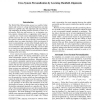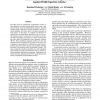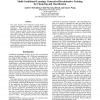130
click to vote
AAAI
2006
15 years 2 months ago
2006
For ontologies represented as Description Logic Tboxes, optimised DL reasoners are able to detect logical errors, but there is comparatively limited support for resolving such pro...
AAAI
2006
15 years 2 months ago
2006
Providing agents with strategies that will be robust against deviations by coalitions is central to the design of multi-agent agents. However, such strategies, captured by the not...
129
click to vote
AAAI
2006
15 years 2 months ago
2006
We present a new efficient algorithm for obtaining utilitarian optimal solutions to Disjunctive Temporal Problems with Preferences (DTPPs). The previous state-of-the-art system ac...
AAAI
2006
15 years 2 months ago
2006
114
Voted
AAAI
2006
15 years 2 months ago
2006
The open nature of collaborative recommender systems allows attackers who inject biased profile data to have a significant impact on the recommendations produced. Standard memory-...
90
Voted
AAAI
2006
15 years 2 months ago
2006
NSF and NASA sponsored a workshop to discuss harvesting solar power in space. One solution considered was the use of a swarm of robots to form a solar reflector. How can these rob...
AAAI
2006
15 years 2 months ago
2006
A long-standing goal of AI is the development of intelligent workstation-based personal agents to assist users in their daily lives. A key impediment to this goal is the unrealist...
118
click to vote
AAAI
2006
15 years 2 months ago
2006
This paper presents multi-conditional learning (MCL), a training criterion based on a product of multiple conditional likelihoods. When combining the traditional conditional proba...
104
click to vote
AAAI
2006
15 years 2 months ago
2006
This paper presents a novel framework for simultaneously learning representation and control in continuous Markov decision processes. Our approach builds on the framework of proto...
AAAI
2006
15 years 2 months ago
2006
Few temporal planners handle both concurrency and uncertain durations, but these features commonly co-occur in realworld domains. In this paper, we discuss the challenges caused b...



